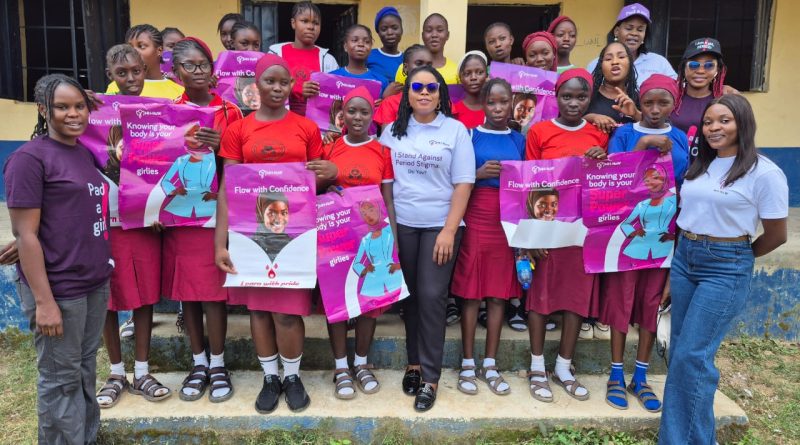PSI Nigeria uses storytelling, local languages to promote menstrual health
Population Services International (PSI) Nigeria, a non-profit organisation, has launched two audiovisual materials that uses storytelling in local languages to promote menstrual health, challenge stigma, and spark open conversations among adolescents and their communities.
In a statement issued on Friday, the organisation noted that the materials are part of an ongoing effort to promote menstrual health and hygiene.
Developed under the Menstrual Health and Hygiene-No Wahala (MH-NoW) project, the audiovisuals- My Red Flower and Menstruation with Dignity, are produced in local languages, Pidgin English and Hausa to resonate with diverse audiences across the country.
 The short films are provided with English subtitles to ensure inclusivity for national and global audiences, enabling broader understanding and engagement beyond linguistic boundaries.
The short films are provided with English subtitles to ensure inclusivity for national and global audiences, enabling broader understanding and engagement beyond linguistic boundaries.
Telling real stories in local voices
The organisation said the films were inspired by real-life experiences of Nigerian girls and women to make discussions about menstruation simple and relatable.
According to PSI Nigeria, the goal is to use culturally relevant narratives to improve menstrual health awareness and understanding menstrual hygiene practice among adolescent girls and young women.
“They make menstrual health conversations simple, relatable, and community driven. Through storytelling and imagery, they challenge taboos, spark dialogue, and encourage collective action toward menstrual equity and dignity for all,” the organisation said.
Screenings in Nassarawa and Akwa Ibom
The audiovisuals were launched in Government Secondary School, Akwanga, Nasarawa State and Goretti Girls College, Akwa Ibom State, where students, teachers, menstrual health champions and other stakeholders watched and discussed the videos.
The session demonstrated practical way to use the materials to aid dialogue sessions, while also gathering valuable feedback on their cultural relevance and user- friendliness.
A student in Akwanga, after watching one of the videos, My Red Flower, said “The video helped me overcome the fear and shame around menstruation.”
In Akwa Ibom, the principal of Goretti Girls College, Eno Ekpo, said she was inspired by how openly menstruation was discussed.
Ms Ekpo said, “This is my first time, at my age and as a principal, seeing menstruation talked about so freely. It should no longer be treated as a taboo.”
She added that unlike in her early days when menstruation was treated as a taboo, the girls in her school are now equipped with the right knowledge to talk about it openly, courtesy of MH-NoW programme.
Beyond schools
PSI noted that the campaign is not limited to schools as they also introduced the audiovisuals to community health champions, parents, and teachers to demonstrate how the materials can be used to guide conversations at home and in communities.
A male teacher who attended the launch described the project as timely and beneficial, noting that it has value for both boys and girls.
“As a man, I have a wife and a daughter, and I’m thinking about how to get this video for my seven-year-old,” he said.
In Akwa Ibom, community health advocate Idoreyin, a menstrual health champion, said the videos have equipped her to better educate girls even when teachers or parents are unavailable.
“They help girls understand their bodies and practice good hygiene with confidence,” she added.
Aligning with Nigeria’s menstrual health policy
The federal government recently validated Nigeria’s first-ever National Policy on Menstrual Health and Hygiene Management (MHHM), a framework that seeks to create a stigma-free society by 2030.
The policy, endorsed in August 2025 by the Federal Ministry of Women Affairs, recognises that menstruation is not only a health matter but also a gender, education, and development issue.
It highlights that millions of Nigerian women and girls between the ages of 15 and 49, representing nearly 30 per cent of the population, continue to face barriers to safe and dignified menstrual management due to stigma, poor infrastructure, and limited access to information.
At the policy validation event, Minister of Women Affairs, Imaan Sulaiman-Ibrahim, stressed that menstrual health must be treated as a human right and a public health priority.
Ms Sulaiman-Ibrahim called for “coordinated action that ensures every girl can manage her menstruation safely, confidently, and without shame.”
READ ALSO: NPHCDA equips FMC Gusau with N300m medical equipment
PSI Nigeria said it views the audiovisuals as strategic tools for continuous health education, stigma reduction, and community engagement, helping adolescents and young women learn, speak up, and manage their menstruation with dignity and confidence.
“I felt joyful seeing how the mother in the video educated her daughter. Not all mothers, like my mother, have time to teach their daughters,” one of the students said.

